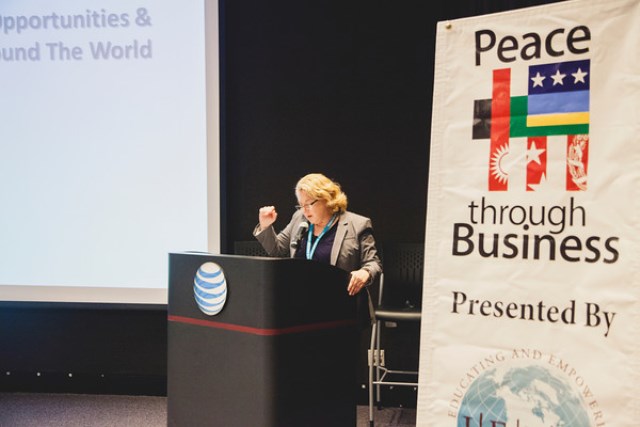By Nadya Khapochkina
Office of Intergovernmental Affairs and Public Engagement
On Monday, Mara Burr, Deputy Assistant U. S. Trade Representative for South and Central Asian Affairs, spoke at a Peace Through Business conference in Dallas, Texas. The event, titled International Women’s Economic Summit, highlighted the necessity of empowering women to further the economic development of their countries.
Burr explained the role of the Office of the U. S. Trade Representative (USTR) in developing, coordinating and implementing trade and investment policy of the United States, and its leadership in trade preference programs. She focused on the importance of empowering women and ensuring that they have access to relevant information, decision-makers and most crucially, the opportunities to chart their own path to success. She also discussed the United States-Afghanistan Trade and Investment Framework Agreement (TIFA) and focused her remarks on the recently signed United States – Afghanistan Memorandum of Understanding (MOU) on Joint Efforts to Enable the Economic Empowerment of Women and Promote Women’s Entrepreneurship. This MOU demonstrates the joint commitment of the United States and Afghanistan to ensure strong interagency and inter-ministerial support and coordination of programs aimed at the economic empowerment of women in Afghanistan. In addition, both governments agree to provide women in Afghanistan access to information about laws, regulations, policies, and other official requirements for starting, running, and growing businesses, including information on international trade rules, requirements, and preference programs. At the annual TIFA Council meetings, the two governments will review progress made under the MOU and identify areas for more focused work.

Deputy Assistant USTR Mara Burr at Peace Through Business conference in Dallas, Texas
Mara Burr elaborated further, saying that, “developing countries like Afghanistan must ensure that the entire population is contributing to its economic growth – not one-third or one-half of the population…Women are important drivers of both creativity and innovation – we have a natural talent to ‘think outside the box’. Creativity and innovation are critical drivers in any economy. So it is only common sense that countries should commit to promoting women and women entrepreneurs to ensure that their economies benefit from the best and brightest minds, the hardworking high achievers who can contribute to the development of their country.”
The Peace Through Business program was created by nonprofit organization Institute for Economic Empowerment of Women (IEEW) in 2006. The purpose of this annual program is to provide women business owners intensive education and training in their fields over a span of two months. The program culminates in a trip to the United States to engage with American women mentors, finishing up with a summit, held in Dallas this year. Sixty women from Afghanistan and Rwanda participated this year, with the top twenty students attending the summit.
Incorporating the gender dimension is a significant driver of developing effective trade policies, and awareness of economic issues faced by women from our trading partner nations increases the scope and relevance of trade negotiations and ensures more sustainable economic growth. The United States Trade Representative works to advance opportunities for women through several other initiatives as well. USTR was active in formulating the APEC San Francisco Declaration to further women’s economic participation, by expanding access to capital and markets, skills and capacity building, and inspiring leadership. Similar objectives have been proposed in the ongoing Trans-Pacific Partnership (TPP) negotiations, and discussed in many of our TIFAs with other developing countries. USTR also works closely with the U.S. Department of State on the African Women Entrepreneurs Program, through the African Growth and Opportunity Act (AGOA).







